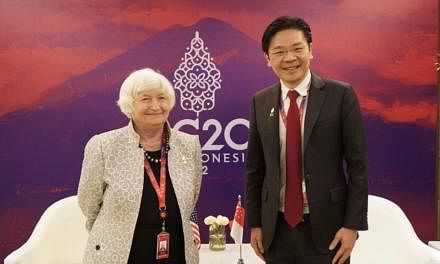MANCHESTER, ENGLAND (REUTERS) - Revenues from football's domestic broadcast rights deals are expected to fall across Europe's top leagues this year, due to a lack of competition between broadcasters, in a further blow to Covid-19 hit clubs who have spent almost a year without fans in stadiums.
Italy's Serie A could announce their deals for the 2021-2024 cycle later this week with revenue unlikely to meet the €1.15 billion (S$1.8 billion) a year target and could fall slightly short of the €973 million a year current deal.
With the Premier League, the French Ligue 1 and Spain's Liga also due to negotiate deals for the next cycle this year, there is little optimism that domestic rights, which had grown strongly over the past two decades, will bring a much-needed cash boost.
Germany's Bundesliga concluded their deal last year, marking a slight fall.
"Everyone agrees that (revenue) will go down," says European television rights consultant Pierre Maes, author of a book on the sector.
The French league has faced the most dramatic situation following the collapse of a deal with Spanish agency Mediapro which led to much reduced revenue for this season.
Broadcaster Canal+, a subsidiary of Vivendi, was left in a strong position and the league will now receive only about €670 million rather than the expected €1.15 billion, according to media reports.
The impact of Covid-19 has not had a significant impact on viewing figures but the flat market is seen as a result of the limited number of players fighting for the rights.
"In the past we had fierce competition for rights and today none of the top five markets has that competition. There was only one factor that led prices to where they are today and that was competition between operators. If you take away competition the risk is there that prices will go down," says Maes.
"In all the big countries we are now back to a monopoly situation or a duopoly situation in some markets," he added.
Sky Sports in the UK shares the rights to the Premier League with BT Sport but there is unlikely to be a bidding war between the two when the competition undertakes its auction later this year.
While Sky will not want to risk losing its rights and the long-standing relationship it has with the Premier League means it is unlikely to seek to massively cut its fees, there appears little incentive to make a higher bid.
"If you are in that position as a Sky or Canal+ or whoever else, you don't need to bid high anymore, you can afford to take a slight gamble and reduce the offer," says Richard Broughton, research director at Ampere Analysis.
"That is what is driving this. It is not that the Pay TV businesses are in trouble, certainly they are under more pressure than they used to be, but the wider markets economics have just reduced the competitors in the market. Until that shakes itself out, we would expect a very flat market if not declines in rights fees," he said.
Online streaming
The only challenge so far to dominant broadcasters such as Sky and Canal+ is coming from online streaming services such as DAZN which sources say submitted the highest bid in the current auction in Italy.
In most cases so far streaming services have been 'supporting acts' to the main broadcaster with Amazon in the UK having the rights to 20 Premier League matches each season.
Despite DAZN's bid for Serie A domestic rights, which sources told Reuters was around 850 million euros per season to show all league matches, a higher offer than current main broadcaster Sky, few in the market see such battles with OTT (over-the-top) services becoming widespread across Europe or globally.
"I don't think OTT will substitute the traditional broadcasters at least not in the short to medium term, I would rather think that OTT will supplement the current offering," said Amikam Kranz, Vice President Media and Sales for media rights agency Infront.
Amazon and DAZN had bids for French league rights turned down before the league signed a deal with Canal+.
If the French situation is a warning sign in the domestic rights market, there are also indications that international sales may also have reached a peak.
Last year, the Premier League had to terminate a $700 million contract with Chinese retail group Suning's PPLive Sports International streaming service and find a new deal, with Tencent, which media reports said was for a lower amount.
Qatar-based beIn Media Group, one of the biggest broadcasters of football, has not yet included itself in an auction for the rights it currently holds to show Serie A in 24 territories in the Middle East. Its current global deal with Serie A is worth US$500 million (S$660 million).
"The decline in domestic rights in the UK (in the last deal) was compensated for by a rise in international rights and definitely that won't be the case anymore," says Maes.







